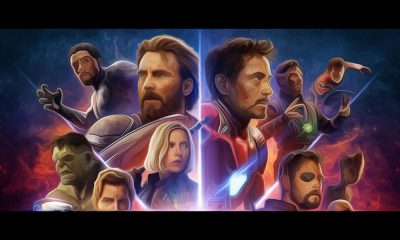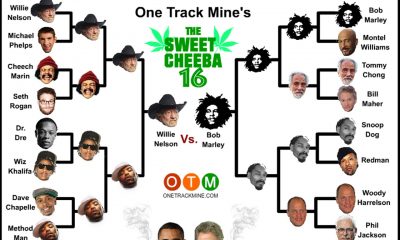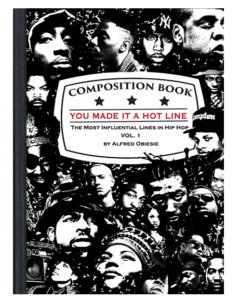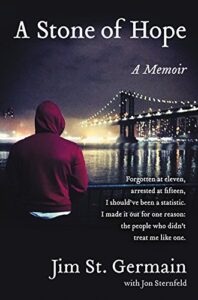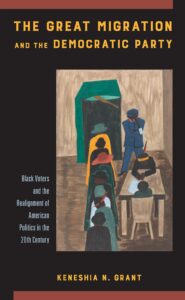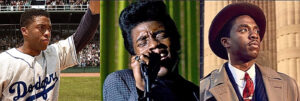Entertainment
Parenting Advice From A Guy With No Kids
Published
10 years agoon

I am not a child psychologist. I have more of an affinity for Mr. Spock than I do Dr. Spock. I don’t even have kids (hence the title.) So what exactly qualifies me to give any advice on parenting and why should you even listen to a guy with no kids? The answers are simple;
- I had parents
- I have over 18 years firsthand experience as a child
- Sometimes you can see things more clearly from the sideline
- For the same reason you should listen to your own kids when they speak. Sensibility doesn’t have to come from tenure.
So here are my awesome parenting tips on how to either raise a well-behaved upstanding individual… or a crazed sociopath. Either way, it’ll be a fun ride.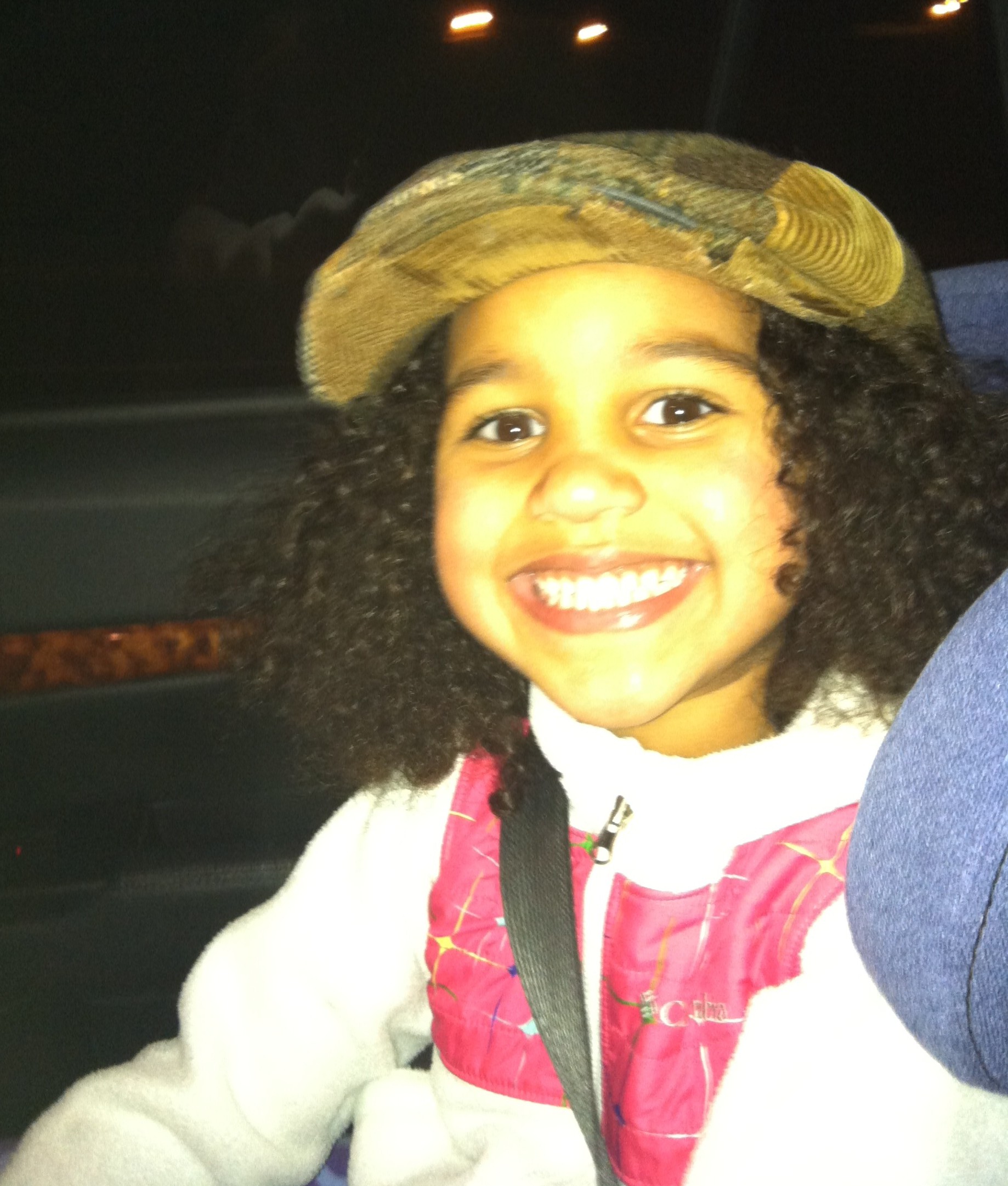
- Don’t use your past to govern your children’s present – Yes, we know you grew up in Brooklyn in the turbulent 80’s in NY, and yes we know you are trained in several different forms of martial arts including Shank-Fu and Backslapkwondo. The problem is your kids did not grow up in such troubled times and your survival tactics, although very relevant, at some point, may have become obsolete. Just because your friends got pregnant at age 15 does not mean your daughter will. Treat your kids according to their environment and behaviors not yours.
- Do not live vicariously through your children – You had your moment in the sun, son! Your son or daughter is not a second chance to finally have a doctor in the family or make the Olympic team, especially when Lil’ Johnny just wants to live a simple and happy life as a plumber. If your kid wants to be a plumber then dammit let him plumb! If you feel that strongly about having a doctor or Olympian in the family then there’s still time to hit the gym and apply to Johns Hopkins yourself. Otherwise, leave them kids alone!
- Be Realistic – You can’t teach what you don’t know. Trying to raise a straight A student when you were a borderline delinquent is probably unrealistic unless you’ve learned and corrected the error of your ways. Maybe your kids aren’t getting the message because you never learned how to effectively deliver it.
- Be Specific – Telling your kids to “try” or “study harder” when they don’t do well sounds good. It also probably sounds exactly like what your parents told you. Direction without example may as well be misdirection. Sit down with them and show them what you mean. Get them a tutor. Consider they are individuals and as such, may have different strengths and weaknesses that need to be nurtured as it relates to learning. Some people have different kinds of intelligences. If you are going to instruct them to try harder, you should probably also do the same.
- Don’t Assume – Don’t assume that because they are smiling they are happy. Don’t assume that they are sad because they are frowning. Find out.
- Create an environment where failing is acceptable – Failing should not only be acceptable, it should be championed. Rather than making kids feel inadequate for failing, make them feel exceptional for trying. You should apply this strategy of course only if they put forth a genuine effort. What were the lessons learned from the failed attempts? What do they intend to do next time around? If they feel comfortable talking to you when they fail without fear of ridicule, they may also feel comfortable talking to you before they even get to the point of failing and avoid it all together with your help.

- Your children should be networking… NOW!! – Most of us have walked the straight and narrow in an attempt to become good citizens. This entails getting good grades, graduating from a reputable college, and landing a job or career. Most of you can attest, however, from personal experience that your performance and knowledge is a factor, but not the main driver for your career advancement. I can’t tell you the amount of co-workers I’ve encountered who have family or friends responsible for their employment and career development (can you say nepotism?) If you believe that all you need are good grades, you are sorely mistaken. If you believe the best time to networking is after you get that dream job, you may never get that dream job. Every playground, summer camp and after school program is an opportunity for your children to begin relationship building. It may sound like you are forcing them to grow up too fast but you are not. You are forcing them to realize that all aspects of life have a political component and better to be prepared and connected than rely solely on merit and talent, especially when merit and talent is not the name of the game.
- Never stop growing – Having a child does not automatically make you a responsible adult. We are all works-in-progress so if you believe you’ve become an awesome parent simply because 7 pounds, 6 ounces maneuvered its way out of your uterus, you’ve got another thing coming (and hopefully it’s not another child). Since your kids are always watching your behavior as their baseline for all things life (and always will be), the better prepared you are, the more likely you can pass on those life lessons, so please, keep learning so you can keep teaching.
- Motivate from a position of confidence, not fear – Everyone responds to fear and truth be told, it can be an excellent motivator. The only problem is when you’ve conditioned yourself to be motivated by fear, you always need to create fear in order to be motivated. You literally have to make yourself uneasy in order to progress. It is as counter-intuitive as it sounds. Try confidence instead. Here’s an example;
- Fear – “If you don’t pass this test, your average is gonna drop and you know I can’t afford college so you need to get a scholarship or it’s gonna be tough.”
- Confidence – “As long as you did the best then it doesn’t matter what your grade is. If you don’t do well then we will find a way around it. Do you need a tutor? You may have to go to summer school or community college but you will be OK.”
And there you have it. Now go forth and raise prosperous, young upstanding citizens!
(So, how would you rate me as an imaginary parent?)
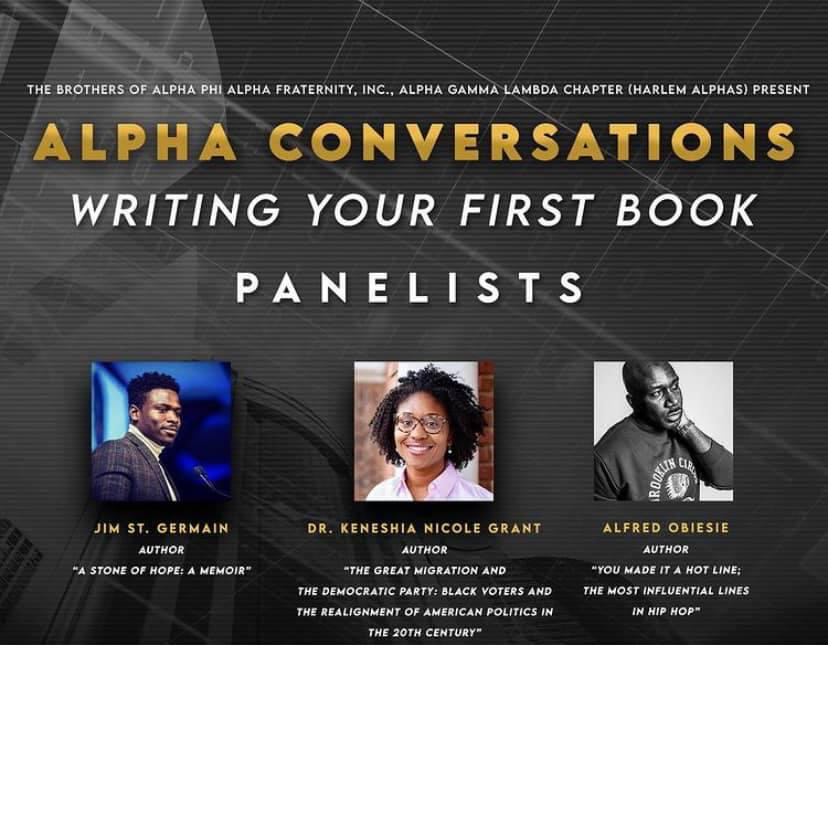
I had the distinct pleasure of participating in a panel discussion on writing your first book, presented by the Harlem chapter of Alpha Phi Alpha Fraternity Inc. Alongside Jim St. Germain, Author – A Stone of Hope: A Memoir and Dr. Keneshia Nicole Grant, Author – The Great Migration and the Democratic Party: Black Voters and the Realignment of American Politics in the 20th Century. We opined on pain points, benefits and strategies regarding our inaugural voyages into authorship. Feel free to watch for your self and I hope this provides some insight to all those looking to make the same voyage. Enjoy!

It is clear that Chadwick Boseman chose iconic roles like Thurgood Marshall, James Brown, Jackie Robinson and Black Panther with deliberate intent and for a specific purpose. In an age where positive roles for Black actors is often sparse, Chadwick managed to land and portray historical figures that made most respect his talents if not revel in his ability to transition effortlessly for one character to another. Even I had to give his African accent a solid B+ (It’s the highest grade the Nigerian Standards Bureau can give for an African accent to a non African FYI.)
Holding out and preparing for these dynamic roles came with both great frustration and incredible resolve I’m certain. Not to mention the taxing ordeal of battling Colon Cancer as the grueling scheduling of filming and increasing responsibility for positive representation loomed. Even under extreme duress, Chadwick’s commitment to others appeared to outweigh his own tribulations, unbeknownst to us all.
Black Panther may have been just a movie to some and that may be because some can easily rattle off 10 movies with a king of non Af-Am origin. It represented a lot more to others. Albeit imagined, imagery on cinema often accomplishes more to augment the social narrative and society itself than actual reality. If negative stereotypes influence perception then positive ones absolutely have the same converse effect.
Even in jest, the cultural misappropriation of raisins in potato salad on SNL skits directly spoke to the tampering of black culture to which T’challa championed, represented and aptly responded “Oh hell Nah Karen!”
If you don’t understand the relevance of representation, it’s probably because you are thoroughly represented. After all, no one is ever grateful for every breath they take until they are gasping for air.
R.I.P Chadwick Boseman. Thank you for breathing life into the possibility of Black excellence.
Article
10 Easter Eggs of Segregation in Lovecraft Country Episode 1
Published
5 years agoon
August 19, 2020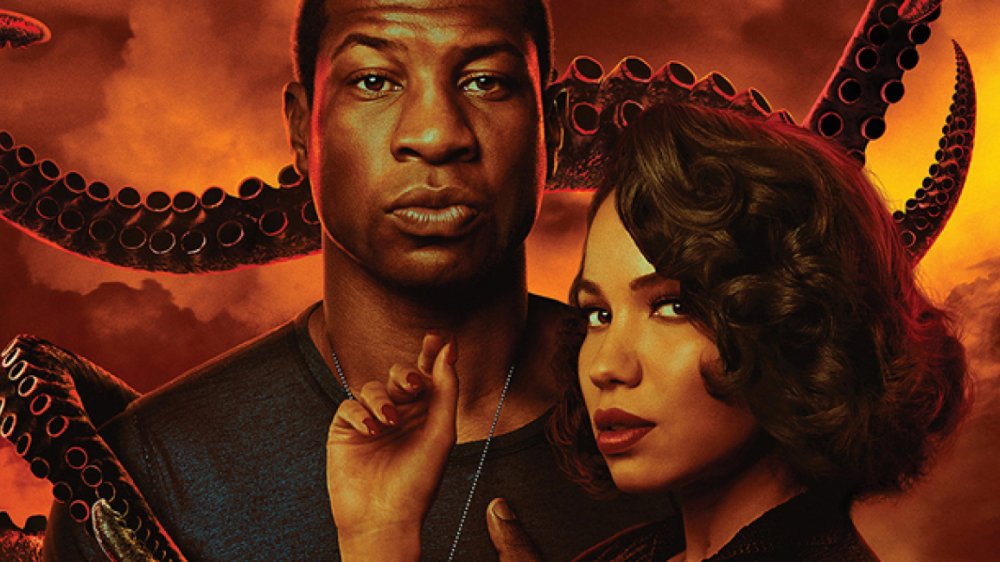
We’re all familiar with movies hiding easter eggs throughout their films sending winks and nods to pop-culture references. Sometimes it will be a tip-of-the-cap to an author, actor, or creator. Sometimes it is paying homage to an inspiring series, book, or film that’s near and dear to the director’s heart. This week I’ve seen a first. A T.V. series that has several easter eggs depicting segregation and oppression that only eagle-eyed aficionado’s of the black struggle might have caught on to.
Lovecraft Country is littered with important details that would fly over many people’s heads, and as I watched it again, I caught more nods to the true oppression of many African-Americans during the post-World War II era.
As a film buff, nothing makes me happier than watching a review, breakdown, or hidden easter egg video on a TV show I enjoy. Yesterday I did the same with Lovecraft Country, and while many of the melanin-deficient reviewers on youtube touched on the themes of literature, horror, and fantasy, many understandably missed some of the most important historical references.
Here are 10 Easter Eggs of Segregation in Lovecraft Country Episode 1.
1. H.P. Lovecraft’s little poem.
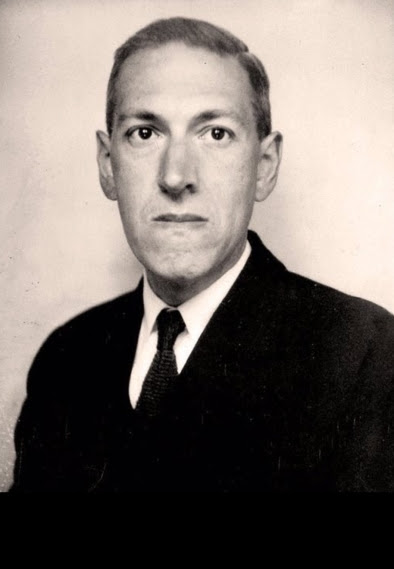
While we all know H.P. Lovecraft as an innovator of modern horror, fiction, and fantasy in literature, many people (including myself) didn’t know about a poem he wrote that spoke horribly about African Americans. Lovecraft Country alludes to the poem, but never recites it. Once they mentioned the title, I went straight to my Google Search. Below is the poem called: On the Creation of N*****s (1912)
When, long ago, the gods created Earth
In Jove’s fair image Man was shaped at birth.
The beasts for lesser parts were next designed;
Yet were they too remote from humankind.
To fill the gap, and join the rest to Man,
Th’Olympian host conceived a clever plan.
A beast they wrought, in semi-human figure,
Filled it with vice, and called the thing a N****r.
I’m sure Jackie Robinson beating the S**T out of Cthulhu at the beginning of the episode was a collective middle finger from the black community to Mr. Lovecraft.
2. Seating for Black People
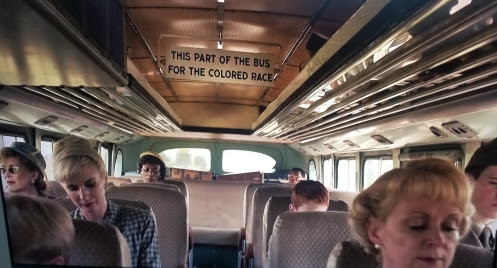
Scene from episode 1
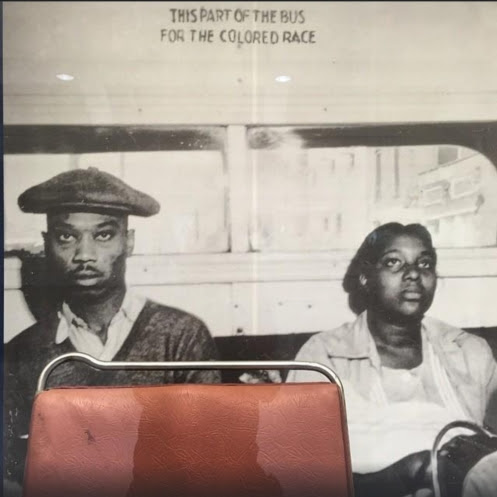
Actual photo of a segregated bus
While this may not come as a surprise to many of you, a lot of people are ignorant to the fact that, yes, black people were made to sit in the back of the bus. Many know the story of Rosa Parks’ defining moment, but for decades this was the way of life for black people. Where insult to injury is predicated in the show is when the bus breaks down and the bus driver gets a local pick-up truck driver to ride the stranded passengers into the city. Immediately in the next scene, the only two black passengers were seen walking down the road into Chicago.
3. Propaganda for the Negro Soldier
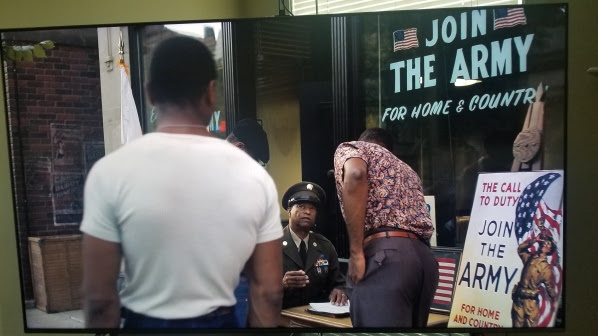

In Lovecraft Country, the above poster is not shown in this episode, but instead, it’s a black soldier telling other young black men that if they enlist, they can see the world. While Atticus walks by the soldier, there’s a glance of recognition as if Atticus was once one of those impressionable young men, and he knows their being lied to. Black men had to be enticed to enlist by different methods than whites because it was hard to show patriotism to a country that still to that day had kept them oppressed. So, they would show a poster of Joe Louis joining the fight…why don’t you? Get to see the world! Little did they know seeing the world would involve PTSD, death, and despair.
4. The Negro Motorist Greenbook
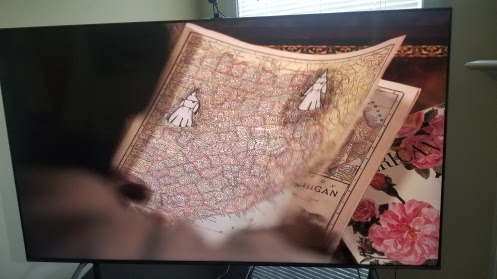
Scene from episode 1 depiction of the Green-Book
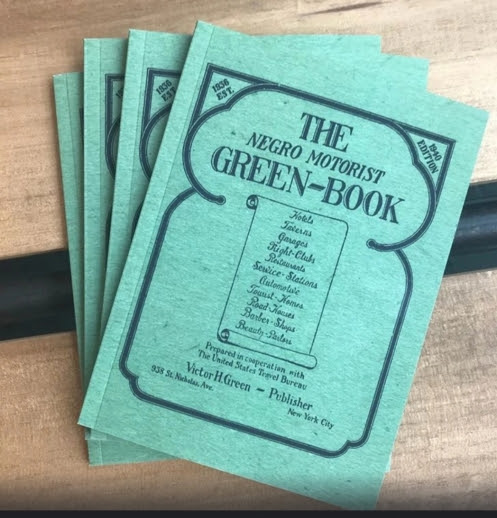
Actual Green-Book
The synopsis according to IMDB.com is: “Lovecraft Country follows Atticus Black as he joins up with his friend Letitia and his Uncle George to embark on a road trip across 1950s Jim Crow America in search of his missing father.” While this is true, it’s not the whole story. Why are they embarking on this trip? It’s to help update what many people may know as, The Negro Motorist Greenbook. Yup, just like the movie, The Greenbook. If you don’t know, this book was originated by Victor Hugo Green as a travel bible for African Americans. It provided details of safe roads to travel, places for food, repairs, and lodging where they wouldn’t be turned away or even worse, assaulted.
5. James Baldwin’s monologue on racial divide
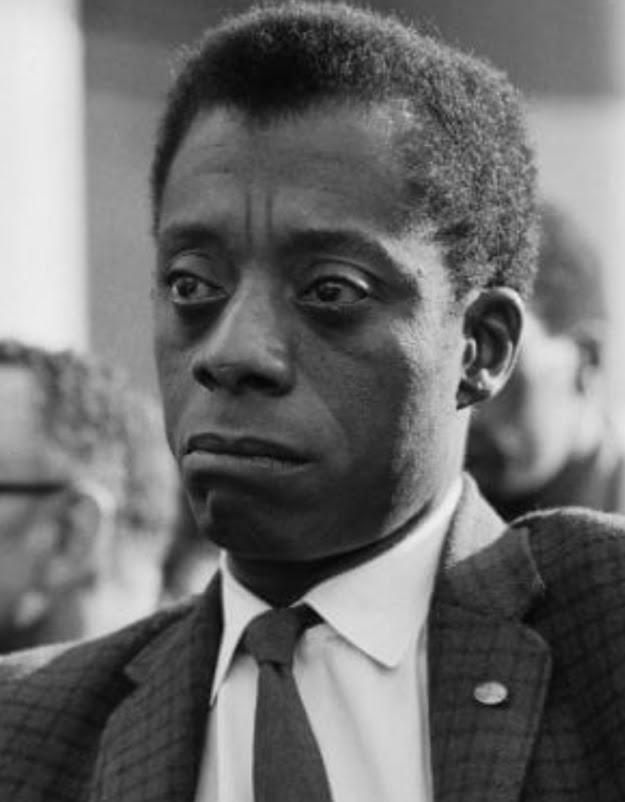
During one of the scenes in Lovecraft Country, we see a montage of our protagonist’s road trip. In the montage we see different moments where they face discrimination, others facing discrimination, and the hardships of ignorant people with all the privilege in the world monopolizing on their entitlements. Usually, during movie montages, a composer would play a score to envoke emotions during the collection of scenes. Lovecraft Country went in a different direction. Instead, they played the monologue of James Baldwin’s renowned speech at Cambridge University where he debated with William Buckley on the subject of the United States racial divide. James Baldwin was a brilliant playwright, novelist, speaker, and activist that eloquently described the plight of the black man as it still stands today. Merged with the scenes during the montage, it speaks volumes about the state of America.
6. Ice Cream stand Scene
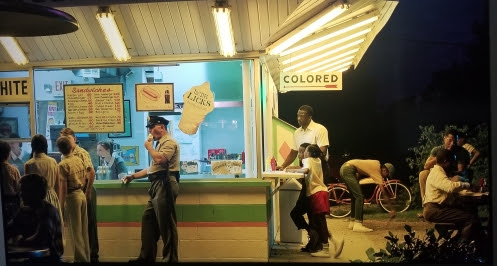
Scene from episode 1
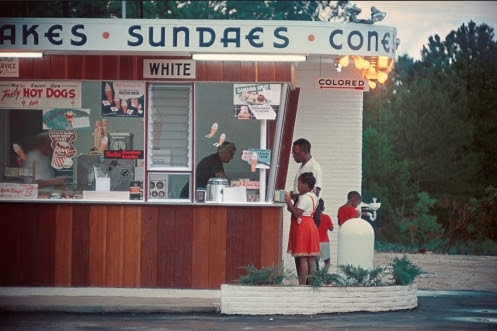
Gordon Sparks photograph
In one of the scenes in the montage, we see a black man and his children waiting at an ice cream stand for service. Right over them is a sign that says “colored” and on the other side of the stand is a group of white people with ice cream being tended to by the servers. This scene looked extremely familiar to me. When I did some research, I realized this scene was based on a famous photograph by Gordon Parks, photographer and journalist who well-documented scenes of the segregation and civil rights era. Years ago I saw his work in its full brilliant quality at the High Museum in Atlanta. The color and detail brought a realism that a black-and-white photo could never do. It made this a real thing.
7. Mother and daughter under the neon sign
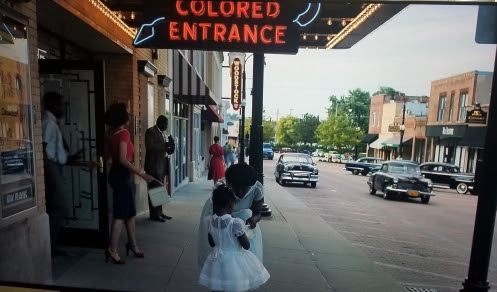
Scene from episode 1
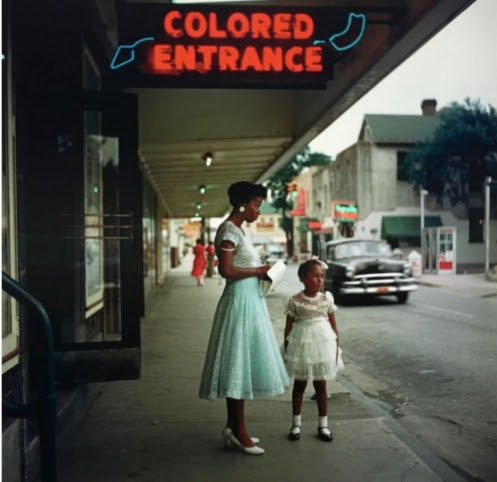
Actual photo
This scene once again pays homage to another photograph by Gordon Parks. A mother and her daughter dressed elegantly as if they were going to church, standing under a large neon sign that says ‘Colored Entrance’.
8. The billboard across from the gas station
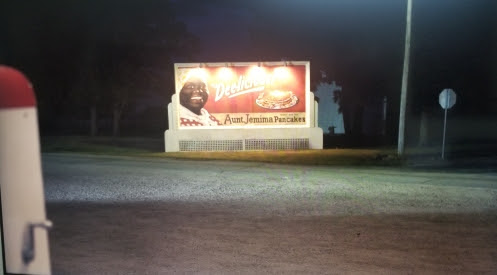
Scene from episode 1
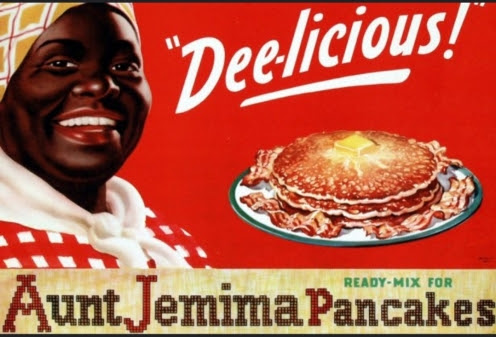
Advertisement the billboard is based on
While Atticus and company are at a gas station filling up their car, they are approached by a gas station attendant pretending to be a gorilla to mock them. Leticia holds Atticus back from approaching the man as the attendant intensifies his ignorant behavior and she forces Atticus into the car. As they pull off, you can see a Billboard for Aunt Jemima in the background. Aunt Jemima has always been a misrepresentation of black culture through the lens of the white man and advertised to his fellow man as the overall perception of black people. The image of Aunt Jemima is a source reflection of the learned behavior of the gas station attendant.
9. Sundown towns
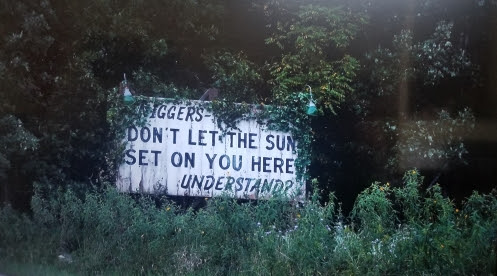
Scene from episode 1
Two years ago was the first time I’ve ever heard of a Sundown Town. No, not through a history book, but as a warning about staying too late in a little town in Texas that exists today! If I didn’t hear about this first hand, I would’ve thought it was a theme of the past, but no. There are currently county’s that do not condemn the abuse of black people once the sun goes down! While the billboard here might be a relic from the past, Sundown Towns are definitely alive and well across America!
10. White walls
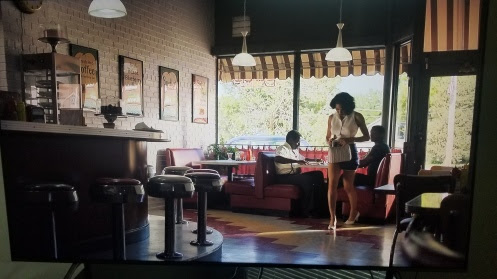
Scene from episode 1
Not only is this one telling, but it also holds all kinds of subliminal messages. While the group finds a Green book safe haven for dining called Lydia’s, they are surprised to find the restaurant is now called, Simmonsville Dinette. Still, they walk in and are greeted by unwelcoming faces. While the server goes to the back for what seems like their coffee orders, Atticus realizes that the walls are painted white. He asks his uncle to remind him why the white house was white. His uncle tells him about the war of 1812 when British soldiers torched it and when slaves were tasked to rebuild it, they had to paint it white to cover up the burn marks. This tells us two things. Lydia’s restaurant was burnt down and rebuilt by trespassers (obviously for being a safe haven for blacks in this all-white town) and the blackness of this restaurant was erased and covered up by the ‘white’ paint. My goodness, I could go on and on about this one!
I was expecting this series to be littered with easter eggs, but knowing they have incorporated easter eggs specifically about the black movement and struggles has me fired up to see what else is in store for these characters. Did you see any easter eggs that I missed? Comment and let me know.




